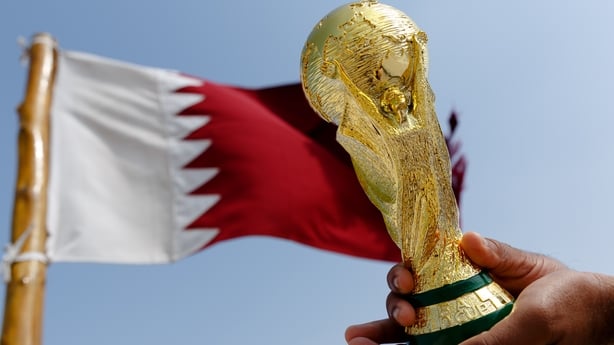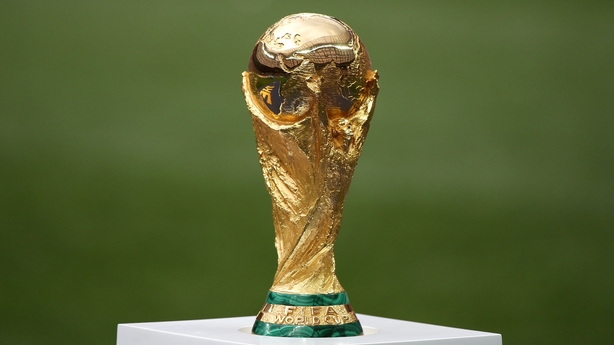"I guess I have my questions about whether, without the international scrutiny, what the level of enforcement and implementation will be and I think it's really important that we do keep an eye on it."
Those were the comments of Amnesty International's head of economic and social justice Stephen Cockburn when he spoke to RTÉ Sport in October last year about the concerns regarding the myriad of issues facing migrant workers in Qatar once the spotlight on the country would inevitably shift after the end of the 2022 FIFA World Cup.
At that point, which was just weeks before the tournament kicked off, he had said that time was "running out" to compensate migrant workers who were adversely affected in the build-up to the World Cup and that abuses were persisting despite some of the welcome and overdue reforms that the Qatari authorities had implemented.
Cockburn had also called on football's governing body FIFA to show more leadership on the push to recompense workers.
But what has changed in the year since the eyes of the world slowly shifted its gaze away following the final on 18 December 2022? And with the growing likelihood that Saudi Arabia - a country under scrutiny in regard to major human rights concerns - will host the 2034 edition, what lessons have really been learned?
In mid-November, Amnesty International published its report into the situation in Qatar a year on from the World Cup, titled A Legacy in Jeopardy, which concluded that "just as the glare of the world's media spotlight dimmed, so too did the government’s push for fair conditions and decent work for the hundreds of thousands of men and women who helped realize Qatar’s World Cup dream and will continue to keep the country moving for many years to come."
This week, Cockburn joined RTÉ Sport to delve into the points raised in the report and concerns about the looming prospect of a potential World Cup in Saudi Arabia 11 years from now.
"We've been continuing to follow what has been happening over the last year and continued to do our research in Qatar. Our overall conclusion is there have been a few areas of small progress but largely it feels the momentum has been lost," he said.
"There is a risk that this potential legacy that was there could be squandered. We've seen slightly better enforcement about workers working in the midday sun and midday hours during the summer. That's better enforced than it used to be.
"But a lot of the promises around enforcing laws around wage abuse for example or on recruitment fees or on a whole range of other issues just haven't really moved forward and it feels like there's a bit of stagnation going on."
Positive steps include the creation of two new labour courts in Qatar, but according to the report, wage theft remains a significant problem, while there are still lingering restrictions in regard to the ability for migrant workers to change jobs.
Enforcement of reforms and existing laws also underpins those issues. For example, under Qatari law since 2021, foreign workers no longer need to provide a Non Objection Certificate (NOC) to their prospective new employers. This was highlighted as an ongoing issue before the World Cup. However, some companies still demand that NOCs be provided to this day, making it more difficult for workers to change jobs.
"It's been reintroduced in many informal ways," Cockburn said of the NOC.

"Now in some companies, the government will still demand a letter of permission which is essentially the same thing.
"We collected a number of job adverts you find online that essentially say that this Non Objection Certificate is still needed. It's illegal but it still happens."
Last year, Amnesty International was among the cohort of stakeholders, ranging from rights organisations to sponsors and select football associations that urged FIFA to commit to a $440m (€449.5m) compensation fund which could draw from the vast revenues made from the World Cup.
A year on, uncertainty remains about how and in what way FIFA will look to give recompense to those workers, with Corkburn outlining that the governing body has indicated that it is due to publish an independent review in the "near future" to address that issue.
'It would be hard to see how Saudi Arabia could meet FIFA's human rights standards without change'
In response to a query from RTÉ Sport about its intended review and the possibility of a compensation fund, a FIFA spokesperson said: "At the moment the Human Rights & Social Responsibility Sub-Committee is currently conducting an independent assessment on whether the steps FIFA has taken to date with regard to access to remedy of workers in the context of the FIFA World Cup Qatar 2022 are in line with FIFA's human rights commitments and responsibilities under relevant international standards and whether additional steps would be recommended in view of further strengthening the tournament’s legacy for migrant workers. This work of the Sub-Committee is currently ongoing."
On that, Cockburn said whether FIFA would accept any recommendations outlined in the independent review "remains to be seen".
"We think according to their own policies, according to international human rights standards and what we and many others have documented over the last decade, FIFA does have to provide real remedy for workers, real money on the table that starts to right some wrongs and starts to make some real improvements in the lives of workers and their families who made the World Cup possible."
While the reverberations from Qatar continue, it appears that a similar controversy, and perhaps on a larger scale, is on the horizon should Saudi Arabia's bid for 2034 be officially rubberstamped.
At the start of November, the gulf nation was confirmed as the sole bidder for an edition that would be restricted to countries affiliated to the Asian Football Confederation and Oceania to host. Fellow AFC member Australia had been the only potential challenger remaining but Football Australia announced hours before a FIFA deadline that it would not be submitting a bid.
Human Rights Watch outlined its alarm about the prospect of a World Cup hosted by Saudi Arabia, saying that, "FIFA's human rights policy will be worth less than the paper it’s printed on if Saudi Arabia’s bid goes forward as planned."

FIFA's own human rights policy states that it "appropriately reflects its human rights commitment in the requirements for the bidding and hosting of FIFA competitions, notably by including in such requirements a clause committing to the principles of this policy, and takes human rights into account in the selection of host countries."
In response to RTÉ Sport's query regarding 2034 and human rights obligations, FIFA highlighted that bidding requirements have been put in place for the recent 2023 Women's World Cup as well as the next men's editions in 2026, with pledges for a thorough process when evaluating submissions to host the 2030 and 2034 tournaments.
"In the case of Saudi Arabia, it should be fairly clear, an independent human rights assessment, if done properly would highlight huge risks of exploiting migrant workers," said Cockburn.
"It would highlight the fact that there is no freedom of expression in Saudi Arabia, that if you're a human rights activist that you will end up in prison or worse. It should show that trade unions are banned. It should show that homosexual activity is illegal. It would show that there are real risks to journalists to speak out.
"This needs to be done properly but those are clearly well-documented risks that ourselves and others have documented many times. There are no great surprises here.
"What's really key is that Saudi Arabia takes seriously what reforms it might be taking in these areas. Will it work with international labour organisations on a series of labour reforms in the same way that Qatar belatedly did?
"Will it revive its penal code? Will it revive its laws on freedom of expression? How will it welcome fans of every sexual orientation? That needs to be clear before something is awarded.
"Before the tournament is awarded, there needs to be a binding commitment with FIFA on those issues and that could provide a basis over the coming 11 years to make progress on those issues.
"The risk is if those commitments are not made, we face the same issues [like] in Qatar where you have a decade of exposing issues, debating issues and maybe getting some change at the end. Actually, there is an opportunity to get some change from the start."
Cockburn added that based on its current policies and record, "it would be hard to see how Saudi Arabia could meet FIFA's human rights standards without change" and that seeing a clear commitment is "what's really at stake over the next year" before any hosting rights are awarded.
He also drew a distinction to Qatar, who he acknowledged had allowed Amnesty International and others access to do their research work in the country, saying that similar oversight "is just not possible right now" in Saudi Arabia.
"These are really important. It can't just be left to the end. It can't just be a vague 'everyone's welcome'. There have to be clear legal guarantees around all those issues," said Cockburn.
Listen to the RTÉ Soccer podcast on Apple Podcasts, Spotify or wherever you get your podcasts.

